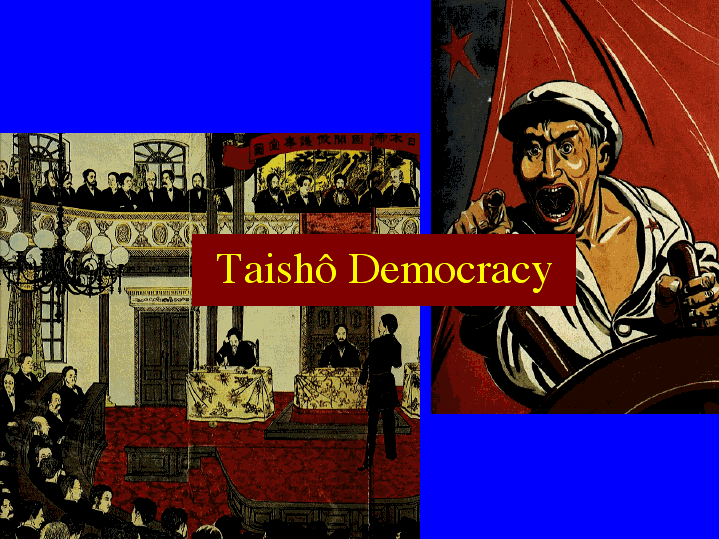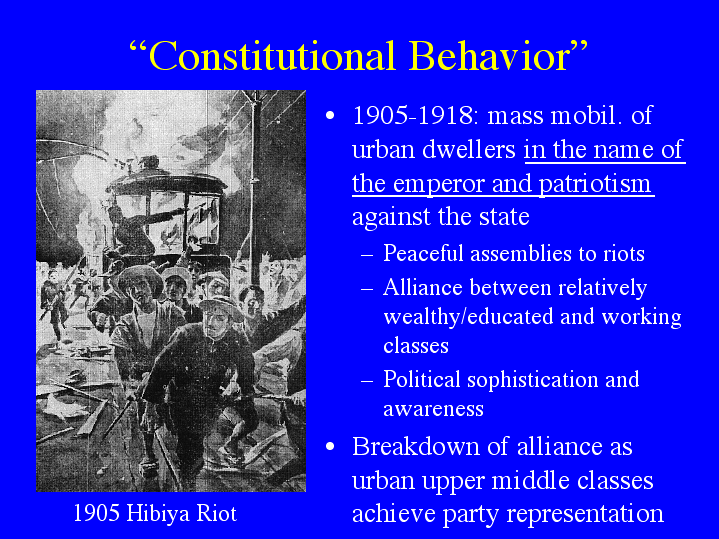
Contestants in the Political Sphere & Claims to Legitimacy
Oligarchs: "Wise and Able" Patriotic Leaders
Put the nation's interest first?
Or sometimes corrupt, corruptible leaders out to line their own and friends'
pockets?
Bureaucracy: The Educated Elite
Cultivation of governmental expertise, techical and "scientific"
knowledge, not political
Ethical qualities of integrity, fairness, dignity, loyalty stresssed--"above
politics"?
But officials steeped in elitism, patriarchalism and arrogance
Cliques and factions around schoolties, sempai-kohai are common
Political Parties: The Economic Elite
Cultivation and deployment of financial resources
Recruitment of "up and Coming Bureaucrats in supposedly immune ministries
Military: The Spiritual Elite
Performance of loyal duties
High command independent of civilian controls
"Right of Direct Access" of Army Navy Chiefs of Staff
Phases Under the Meiji Constitution
1890-1910s: Oligarchs & Bureaucracy
1920s: Conservative Political Parties as Coordinators
1930s: Increasing Importance of the Military
1937-1945: Total War Mobilization Coordinated by the Military & Bureaucracy
Transitions took place relatively smoothly
Interactions between these groups shaped their internal structure and functions
Interactions with groups outside of the center also had an impact on their
nature and interrelationships
Oligarchs
Who were they?
Lower level samurai from Satsuma and Chôshû
Lower level nobility in the Kyoto court
Path to power:
Be an adviser to tozama daimyo or noble
Become the emperor's tutor/confidante
Gain expertise in administration and alliances
Monopoly on cabinet and prime ministership through turn of the century
Problems:
No regular mechanism for replacement
Whose interests did they represent: nation? region? personal networks? themselves?
Bureaucracy
First Generation
Replace Tokugawa authorities with loyal men who share similar background &
goals
No explicit regulations regarding appointment, tenure or advancement
Cliques as organizational principle
Later Generations
Legitimacy increasingly based on claims to "scientific" or "objective"
knowledge of governance
Specialization
Exclusivity
Routinization & rationalization of recruitment & promotion
Insulation from "special interests"
Cultivated by oligarchs to keep government in the hands of "experts"
not the masses
Whose interests did they represent?
Claim: "nation" because positioned above and insulated from specific
interest groups
Alternative View 1: defenders of the interests of the state as a special interest
group
Alternative View 2: defenders of special interest of particular ministries
Problems:
Increasing specialization meant difficult to produce "generalist"
to take the helm
Rivalries between ministries = prioritization difficult
Military
Strengths:
Responsible only to the emperor, two separate cabinet positions, command of
important resources
Weaknesses:
Desirous of ever increasing budgets, factionalization
Whose interests?
"Nation" by virtue of duty and sacrifice
Alternative View 1: another special interest group within the government
Alternative View 2: cliques, rural concerns
Formation of Political Parties
The Popular Rights Movement
Oligarch Itagaki Taisuke ousted in struggle regarding invasion of Korea and
founded Public Party of Patriots (Aikoku Kôtô)
Called for greater public participation and an elective national assembly
"Defense of Japanese interests abroad"
From educated upper-middle class to more inclusive membership
1878 Kusunose Kita & 1879 publication of Chichibu farmer appeal
Ruthlessly suppressed but Aikoku Kôtô survived
"Constitutional Behavior"
1905-1918: mass mobilization of urban dwellers in the name of the emperor and
patriotism against the state
Peaceful assemblies to riots
Alliance between relatively wealthy/educated and working classes
Political sophistication and awareness
Breakdown of alliance as urban upper middle classes achieve party representation
Contest over Definitions of "Constitutional Behavior"
Meant for the protestors: respect for the public good, freedom of action, assembly
and expression, respect for the will of the people
If thru mystical tie emperor "knows" the people, then conversely
the people "know" the emperor
NOT reference to technical apparatus whereby a (limited) representative government
created and enacted policies with passive support of emperor and general population
Bureaucracy v. Parties
Early years of Diet, Lower House dominated by former Popular Rights activists
who wanted to make the cabinet accountable
Free space of Diet, harassment of oligarchs
Refused to agree to budget increases
Obstacles to party power: Upper v. Lower House and no control over regional
appointments
Fracturing the oligarchic circle:
Yamagata & police interference at polls
Itô: Yamagata threatened constitution, made deal with party leaders
to form "pro-government" party
Taishô Democracy

Centrist parties gained power when compromised with bureaucracy and military
Used veto over the budget to bargain for cabinet appoint.
Provided mediation between ministries
Gained power over appt. of prefectural governors
Increasing allegiance to maintaining power and elite voter base
Conservative Parties
Seiyûkai
Trace descent from PRM and Itô pact
Greatest strength in rural areas (lower land taxes, more civilian spending)
Tremendous party machine thanks to Hara who ably recruited bureaucrats
Minseitô
Formed by smaller parties in response to Seiyûkai dominance
Urban white collar base
Anti-clique, relatively more liberal
But two parties converge over time
Removal from popular constituencies
Increasingly tied to big business
Parties on the Left
Japanese Socialist Party (JSP)
1898 Socialist Study Group > 1901 Social Democratic Party (banned 2 days
later) > 1906 (banned next year)
Platform: disarmament, public ownership of land & capital, free education,
universal suffrage through legal means
Japanese Communist Party (JCP)
Distinction between intellectual and political movements
Founded 1922, disbanded 1924, refounded 1926, disbanded 1942 with forced conversion
of several leaders
Similar platform to JSP but more radical stance on tactics
Gov't suppression isolated JCP from international movement
Farmer-Labor Party (1925, banned) > Socialist Mass Party
Activist unionization movement
Universal Manhood Suffrage
Popular disaffection with mainstream parties
Trajectory from Hibiya Riots > Rice Riots > Demos > 1923 Earthquake
suggested that to win back popular support had to broaden the franchise
1925 Universal Manhood Suffrage
1925 Peace Preservation Law passed at same time to control radicals on the
left
Women and Politics
Active in Popular Rights Movement
1890 women prohibited from attending political meetings & joining parties
Grouped with minors, mentally infirm, soldiers
Avenues to break into politics
Good wife, wise mother tactic
Membership in leftist organizations
1922 women allowed to attend political meetings but not join parties or vote
Elite & middle class women brought into government in their fields of
"expertise"
Taishô Democracy?
What is a true democracy?
What are the mechanisms of representation?
Who is represented and not represented?
What is good governance?
Option 1. Yes
Conformance in technical aspects
Ground laid for postwar reforms
Option 2. No
Non-conformance in spirit
Elite and not liberal
Option 3. Yes
Both character and practice democratic and pluralistic
But democracy not necessarily opposed to the emperor or imperialism